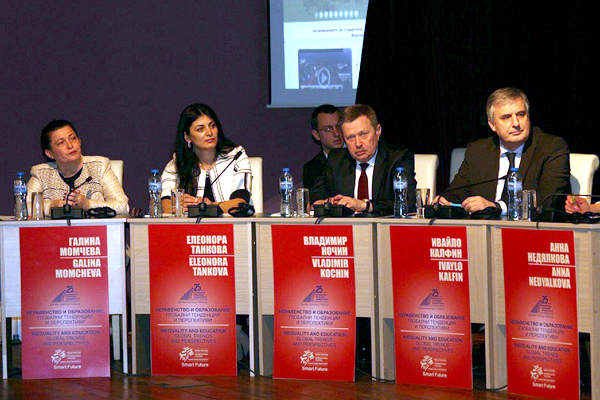
Varna has hosted the International Forum “Inequality and Education: global trends and perspectives”. The discussion was attended by representatives of government and business, state and local authorities, and diplomats. The forum also saw S.N. Lukyanchuk, the Consul General of Russia in Varna, and S.A. Smityushenko, director of the Russian Cultural and Information Centre in Sofia. Representatives of the partner-universities from France, Spain, Germany, China, Poland, and well-known scientists representing various professional fields participated, as well.
Ivailo Kalfin, Deputy Prime Minister and Minister of Labour and Social Policy, Lilyana Pavlova, Minister of Regional Development, Vladimir Kochin, Executive director of the Russkiy Mir Foundation (Russia), Lazar Gruev, former chairman of the Supreme Court of Cassation, Lee Jin - President Sanda University in Shanghai (China), Antonio Amado, professor at the University of La Coruña (Spain), and Martin Units, Head of the SORTIS GROUP, held speeches during the forum’s events.
The goal of the discussion was presented by Anna Nedyalkova, President of the Varna Free University, as a search for the possible decisions to improve the role of education and technology as a factor for reducing inequality.
The discussion touched upon the most different aspects of this issue. Vladimir Kochin of the Russkiy Mir Foundation stressed that many of the problems in Russia are similar to what is happening in other European countries.
In the 90s of the last century, Russia has faced a demographic decline, so, the number of the university applications went down reducing admission parameters. The number of private educational institutions increased; however, the quality of education decreased. Their activity is subject to ongoing control by the state authorities. There are also problems with the secondary vocational education, because Russia simply lacks experts in different areas for such education.
Lilyana Pavlova fully supported the need to gain more attention to the secondary vocational education in Bulgaria as well; she believes this is where the links of the educational system are the weakest. "Everyone wants to receive higher education; however, we in Bulgaria do not require that amount of such specialists," – she said.
"The introduction of the Unified State Exam system evens the chances to be accepted by the best universities. Equal access to education is only one side of the issue; the possibility of receiving good education depends on the person," – said Kochin.
He cited an example of the Russian Center of the Varna Free University as a platform to develop new projects to promote Russian language around the world. Among such projects are providing remote access to the Russian State Library resources, to its online hall of thesis researches and more. This has become possible thanks to the digital technologies. In conclusion, Kochin underlined, that "the role of a mentor, despite of the fact that modern digital technologies and databases are in the open access, becomes more significant."
The discussion was spirited; the participants answered many questions about different aspects of inequality – educational, social and business. Many famous scientists from universities in the US, Europe, Russia, China, and Africa participated in the discussion online.
During the final part of the forum S.A. Smityushenko, Director of the Russian Cultural and Information Centre in Sofia, on behalf Rossorudnichestvo, presented Anna Nedyalkova with a commemorative medal for her contribution to the development of humanitarian cooperation between Russia and Bulgaria in the field of education, science and culture.

 Varna has hosted the International Forum “Inequality and Education: global trends and perspectives”. The discussion was attended by representatives of government and business, state and local authorities, and diplomats. The forum also saw S.N. Lukyanchuk, the Consul General of Russia in Varna, and S.A. Smityushenko, director of the Russian Cultural and Information Centre in Sofia. Representatives of the partner-universities from France, Spain, Germany, China, Poland, and well-known scientists representing various professional fields participated, as well.
Varna has hosted the International Forum “Inequality and Education: global trends and perspectives”. The discussion was attended by representatives of government and business, state and local authorities, and diplomats. The forum also saw S.N. Lukyanchuk, the Consul General of Russia in Varna, and S.A. Smityushenko, director of the Russian Cultural and Information Centre in Sofia. Representatives of the partner-universities from France, Spain, Germany, China, Poland, and well-known scientists representing various professional fields participated, as well.